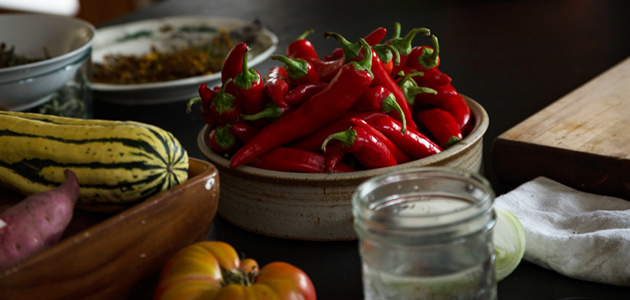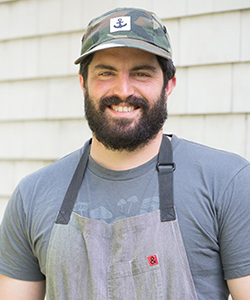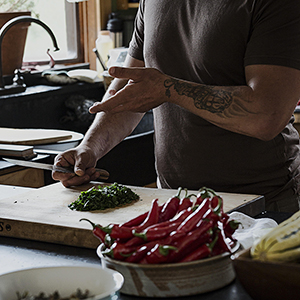- Johnny's Farm Visits & Grower Profiles
- Johnny's 2021 Grower Profiles
- Johnny's 2020 Grower Profiles
- Johnny's Tools Advisor Eliot Coleman: Celebrating Over 20 Years of Partnership | Johnny's Selected Seeds
- Late-Summer Recipe Preview with Farmer-Chef Frank Giglio | Three Lily Farm, Thorndike, Maine
- Johnny's Selected Seeds Visits Martha Stewart's Farm in the Hudson River Valley
- Javier Zamora of Javier Sanchez Medina (JSM) Organics Farms | Royal Oaks, California | Johnny's Farm Visits & Grower Profiles
- Farm Visit: 4-Town Farm, Seekonk, Massachusetts | Johnny's Selected Seeds 40th Anniversary
- Grower Profile: Selwood Green, Walton & Halifax, Nova Scotia, Canada | Johnny's Selected Seeds 40th Anniversary
- Grower Profile: Peach Crest Farm & Cooper Organics, Stratford, Oklahoma | Johnny's Selected Seeds 40th Anniversary
- Farm Visit: Paradise Farms Organics - Homestead, Florida | Johnny's Selected Seeds 40th Anniversary
- Grower Profile: Growing Power Urban Farm - Milwaukee & Madison, WI & Chicago, IL | Johnny's Selected Seeds 40th Anniversary
- Grower Profile: Slegers Greenhouses - Strathroy, Ontario, Canada | Johnny's Selected Seeds 40th Anniversary
- Grower Profile: Gathering Together Farm - Philomath, Oregon | Johnny's Selected Seeds 40th Anniversary
- Grower Profile: Pleasant Valley Farm - Argyle, New York | Johnny's Selected Seeds 40th Anniversary
- Farm Visit: Mark's Melon Patch – Dawson, Georgia | Johnny's Selected Seeds 40th Anniversary
- Grower Profile: Louie's Pumpkin Patch - Skövde, Sweden | Johnny's Selected Seeds 40th Anniversary
- Grower Profile: Living Water Farms - Strawn, Illinois | Johnny's Selected Seeds 40th Anniversary
- Farm Visit: Circle Fresh Farms - Denver, Colorado | Johnny's Selected Seeds 40th Anniversary
- Grower Profile: Freedom Farm - Freedom, Maine | Johnny's Selected Seeds 40th Anniversary
Like so many of us, chef Frank Giglio reached adulthood without ever hearing much about the field of plant breeding. That all changed when he moved to Three Lily Farm on 26 acres in Thorndike, Maine. Through a serendipitous childhood family friendship, Frank met Emily Rose Haga, Johnny's tomato and pepper breeder, who had also just moved to Maine.
A second, parallel connection formed between Frank and Johnny's via the Unity Food Hub, where Frank served as the fulcrum chef at our 1st Annual Seed-to-Table Variety Tasting, a role he expanded upon for our 2nd Annual Seed-to-Table Variety Tasting. Frank became one of the first people to be introduced to many of the new varieties bred by Johnny's, helping us test their culinary potential before they hit the market.
The Seed-to-Table Pipeline
Most of us are familiar with the Farm-to-Table movement. But the life of a new variety doesn't start at the farm when the seed is planted. It begins many years earlier with plant breeders, who develop new varieties through careful crossing and selection over several generations, followed by collaboration with farmers and chefs/eaters to test the promising new varieties before release. The Seed-to-Table movement goes deeper behind the scenes where our food comes from, and helps bridge stronger connections between breeders, growers, and eaters.
Here's a distillation of a Seed-to-Table pipeline typical for Johnny's Variety Tasting Events:
During winter the plant breeders work closely with the Unity Food Hub to coordinate on-farm trials with experienced Maine farmers. The farmers are requested to plant seed and grow out the promising new varieties we are looking to bring to market and for which we need real-world feedback. Once mature, the crops are harvested and delivered via the Unity Food Hub to a series of high-end regional chefs who have agreed to give them a solid trying-out. The chefs apply their talents and inspiration to develop new, one-of-a-kind recipes, and bring their favorite results to the table. The doors to the event are thrown open and the public invited to freely attend, to meet the breeders, farmers, and chefs; experience these new varieties for themselves; and learn about their whole story from seed to table. The participants not only get a sneak-peak at what we've been working on, but also have the opportunity to provide candid feedback on the whole eating experience as they taste the prepared dishes alongside raw and plain-cooked versions.
Frank had recently received a sample of the year's first field-harvested 'Valentine' grape tomato and 'Red Ember' cayenne pepper, and we were curious for news on how the chef-crop pairing was progressing. So we got in touch with Frank, and he graciously invited us to his farmhouse kitchen for an update.
Taste-testing at Three Lily
Before we continue, it bears mention that although he lives entirely off-the-grid in rural Central Maine, Frank is anything but removed from the Zeitgeist. Not only is this entrepreneurial chef at the vanguard of the sustainable community food system in this neck of the woods, but Frank is a classically trained, NY Times Bestseller chef of considerable renown.
With his strong focus on wild, seasonal, and local ingredients, 'Valentine' and 'Red Ember' make an especially great match for Frank because he is fanatical about extending the shelf life of an ingredient, particularly here in Maine. Having waited all year long to taste fresh tomatoes and peppers, when they finally do come into season, he immediately asks himself, How could I eat these in January, without having to buy out-of-state tomatoes or peppers?
Frank's fascination with fermentation, salting, drying, and smoking as means to extending the life of ingredients, maximizing nutrition, and building flavor lends itself well to these two varieties. Here is a preview of the culinary potential of this pair in Frank's capable hands.
'Red Ember' Cayenne Pepper
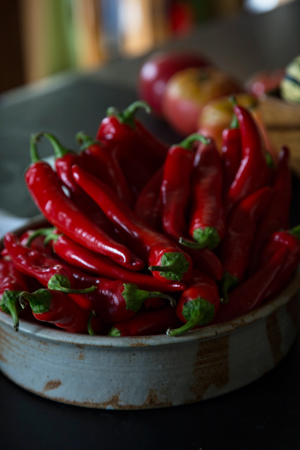
Our breeding goals
- Sweet, mild cayenne with dual fresh/dry/culinary potential
- Distinctive shape
- Early maturity for type
Variety characteristics noted by Frank
- Early availability compared to other peppers
- 6–7 out of 10 heat level — not overwhelming; more on the milder side of spicy, which for some is plenty hot enough
- Tremendous flavor on first bite, without immediately burning the throat; heat lingers in the upper part of the throat with flavor all around it
RECIPE: 'Red Ember' Sambal Matah
(Balinese Relish, Maine Style)
Note: Sambal matah is a famous raw relish from the Gods island of Bali. Frank spent a period of time leading yoga teacher training at a retreat in Bali back in 2010, and became enamored of the dish the Balinese cooks prepared fresh each morning from ginger, garlic, shallots, lemon grass, red chilies, and coconut oil. Sambal has been the making of many a great dish; this recipe is Frank's Maine variation on the theme.
INGREDIENTS
- 1 dozen 'Red Ember' peppers, stems removed and minced
- ¾ large, fresh onion, minced (Frank uses 'Ailsa Craig')
- 2 large cloves of garlic, minced (Frank uses 'German Red')
- 1 cup loose, flat-leafed parsley, minced (Frank uses 'Giant of Italy')
- 2 Tablespoons apple cider vinegar (Frank likes Sewall's Orchard Apple Cider Vinegar)
- 2 teaspoons sea salt
- Olive oil to desired consistency
INSTRUCTIONS
- Combine all ingredients in sterilized, 1-quart canning jar.
- Cover, refrigerate, and use as desired. Frank especially loves to top roasted fish and potato salad with a spoonful or two of this relish.
'Valentine' Red Grape Tomato
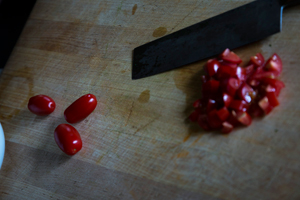
Our breeding goals
- High lycopene content
- Early blight resistance
- Grape-type tomato with distinctive mini-San Marzano shape
- Dark red color
- Unique flavor/texture compared to other grape tomatoes
Variety characteristics noted by Frank
- Good, meaty firmness throughout
- Easy-to-handle shape, with greater cutting versatility than globe-shaped tomatoes
- Thin, nonpapery, edible skin
- Sweetness that balances well with smoking
Works in Progress
Frank is exploring the culinary characteristics of 'Valentine' in a variety of ways. In the process of preserving the harvest for later enjoyment, he is experimenting with concoctions that include a fermented 'Valentine' hot sauce, a smoked 'Valentine' jam, and smoked–dried 'Valentine' ketchup — which is simply out-of-this-world delicious. He notes 'Valentine' has a flavor profile with sweetness that nicely balances with smoke.
Frank has been experimenting with fermented foods for over 10 years. He read about basic food preservation principles and practices in Sandor Ellis Katz's The Art of Fermentation, which he calls the fermentation Bible, and worked with a friend in Vermont to learn more about the production side of doing ferments.
Here is a summary from Frank of one of his most intriguing possibilities.
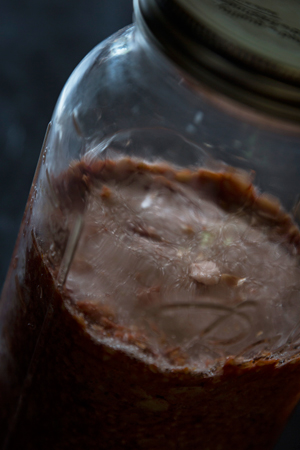
Making Miso with 'Valentine' Tomato
Miso can be a year-long endeavor for anyone who wishes to create a more traditional-style ferment. But with short-term miso cultures, you can have a finished product in less than a month's time.
Miso generally consists of 3 ingredients: a bean (traditionally soy); salt; and koji grains (rice inoculated with Aspergillus oryzae). Once the ingredients are cooked and mashed together, a year-long ferment follows, allowing the bacteria to work their magic.
I decided to add in the 'Valentine' tomato in powdered form to see how the naturally sweet flavor incorporates into the final product. I suspect the sugar content will also help feed the bacteria as it ferments.
These are just a few of the one-of-a-kind concepts emerging from the bustling Three Lily kitchen. If they've kindled your imagination, give growing these varieties a try, then get cookin'!


